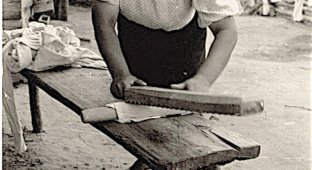Curfew is a useful medieval custom that was observed in every European home (6 photos)
Almost every medieval home in Europe had an open hearth, where a fire was kept burning continuously for warmth, as well as for baking and cooking. The hearth was an integral part of the home and was usually located in the center so that family members could gather around it in the winter. 
Despite the fact that the hearth was such an important part of the home, it was a serious potential fire hazard since most homes were built of wood. To prevent an unattended fire from accidentally burning down the house, people were advised to cover it with metal utensils before going to bed. To remind people of this important step, churches began to ring a bell at a predetermined hour in the evening. This warning was known as a curfew. 
The curfew bell in Leadhills, Lanarkshire, Scotland
The curfew law is believed to have been first introduced by King Alfred the Great in the 9th century as a precautionary measure to prevent destructive fires from breaking out. The aim was not to extinguish the fire entirely, but simply to calm it. At the sound of the curfew bell, burning logs were removed and the cold ashes were raked into a pile to cover the fire. Such a fire would often smoulder for several days, providing warmth, and could be easily rekindled the next morning by simply adding a few logs and allowing air to escape through the ashes. 
After William the Conqueror invaded England, he found the curfew law a handy tool to keep the Anglo-Saxons in line. By banning the use of live fire after the curfew bell, William found that he could prevent rebels from moving about at night, forming associations, and plotting. 
Clay shield for the hearth
"Between the evening twilight and the pre-dawn grayness, you can barely make out the walls of the houses, because in the medieval city, as we have already said, there is no lighting," wrote Arsenio Frugoni in his book "A Day in a Medieval City." "In the evening, the entrances to dangerous areas are blocked, chains are stretched across the river to prevent a sudden attack by barbarians coming upstream, and the city gates are tightly locked. The city is like one big farm, where everything is well guarded." 
Couvre-feu - a shield for the hearth and fireplace
The word "curfew" comes from the Old French cerre-feu, which later became couvre-feu in Norman after the English conquest. Each of these terms means "to cover the fire." There was even a utensil known as a couvre-feu, a kind of shield that was used to cover the fire when the bell was rung. It was usually found only in the homes of the wealthy. 
St Peter's Church, Sandwich, where the bells are still rung every evening at 8pm
During the reigns of William I and William II, the curfew was strictly observed. But William II's successor, Henry I, relaxed the curfew and lifted the absolute ban on lighting lights after the curfew bell had rung. However, the practice of ringing the bell at a certain hour in the evening survived and continued into the 19th century in many British towns, especially in the north of England. Although by then it had ceased to have any legal status.
The tradition is still carried on in Sandwich, Kent, where the curfew bell, known as the 'Pig Bell', is rung at St Peter's Church every evening at 8pm. In Ruthin, Denbighshire, the custom died out in the 1970s but was revived in 2020 after the bells of St Peter's Church were restored.






























